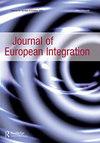Negotiating and governing the economic and monetary union
IF 3.1
1区 社会学
Q1 INTERNATIONAL RELATIONS
引用次数: 0
Abstract
ABSTRACT The literature on the Economic and Monetary Union has expanded substantially in the last decade, especially in the aftermath of the Eurozone crisis. Important gaps remain, though. Three new books advance new insights both theoretically and empirically. Employing qualitative and quantitative methods, these books study aspects of decision-making during the negotiations of the latest reforms, their consequential institutional design and the oversight interactions between EU institutions. The findings of the books demonstrate how the institutional complexity and weaknesses of this policy field influence the functioning and democratic legitimacy of EU institutions. As a remark, they contribute to the ongoing debate on further reforms in order to increase fairness among and within the EU institutions and the member states, encourage responsiveness and improve political and judicial accountability.谈判和管理经济和货币联盟
关于经济和货币联盟的文献在过去十年中大幅扩展,特别是在欧元区危机之后。但重要的差距依然存在。三本新书在理论和经验上都提出了新的见解。这些书籍采用定性和定量方法,研究了最新改革谈判过程中的决策方面,其相应的制度设计以及欧盟机构之间的监督互动。这两本书的研究结果表明,这一政策领域的制度复杂性和弱点如何影响欧盟机构的运作和民主合法性。一言以概之,它们促进了正在进行的关于进一步改革的辩论,以增加欧盟机构和成员国之间以及内部的公平性,鼓励回应并改善政治和司法问责制。
本文章由计算机程序翻译,如有差异,请以英文原文为准。
求助全文
约1分钟内获得全文
求助全文

 求助内容:
求助内容: 应助结果提醒方式:
应助结果提醒方式:


